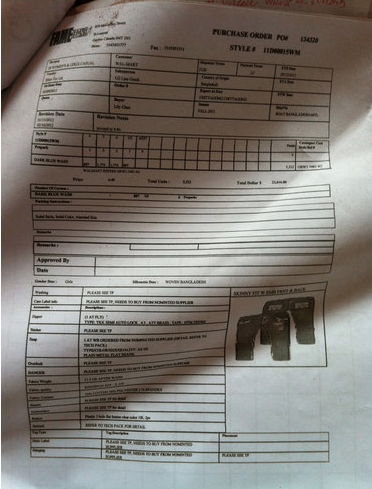Walmart Creates Its Own Bangladesh Factory Safety Program

The Bangladesh Center for Worker Solidarity said it found this document tying a Walmart vendor to the collapsed Rana Plaza factory building.
Many of the American retailers and apparel companies that source products from Bangladesh have maintained that they already have their own inspection processes in place, but critics have voiced concern that these inspections are not done by independent parties and that the results are not transparent.
According to the Wall Street Journal, Walmart will use an outside auditing company to inspect 279 Bangladesh factories and will publish the results of those inspections on its website by June 1.
Unlike the Accord on Fire and Building Safety in Bangladesh, which has been signed by Euro biggies like H&M and Zara, and requires signatories to help fund repairs and upgrades, Walmart will not be paying for repairs. Rather, it will use its leverage as the world’s largest retailer, compelling facility owners to make upgrades or face losing Walmart’s business.
That being said, Walmart does expect that it will have to pay more for the goods it gets from the improved factories.
“We don’t want anyone to cut corners to put workers safety in jeopardy,” a company rep tells the Journal.
Yesterday, the company posted a list [PDF] of more than 200 factories in Bangladesh that it has already stopped working with, though the list does not go into details of why each facilities was red-flagged.
Walmart’s announcement comes at the same time as a New York Times report reveals documents showing that in 2012 a WalMart contractor from Canada had produced jeans in the now-collapsed Rana Plaza building outside of Dhaka.
However, the company says that nothing was being produced for Walmart at the time of the tragic collapse.
“Our investigation of the Rana Plaza building site after the collapse revealed no evidence of authorized or unauthorized production at the time of the tragedy,” a Walmart rep tells the Washington Post. “If we learn of any unauthorized production, we will take appropriate action based upon our zero-tolerance policy on unauthorized subcontracting.”
Some major U.S. retailers are still expressing interest in signing the union-backed accord, though they reportedly have concerns about the fact that it’s legally binding. As of now, PVH — the parent company of Calvin Klein, Tommy Hilfiger, Izod, and other brands — is the only U.S. company to sign the accord.
Want more consumer news? Visit our parent organization, Consumer Reports, for the latest on scams, recalls, and other consumer issues.

